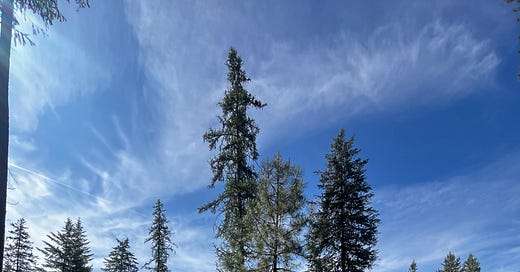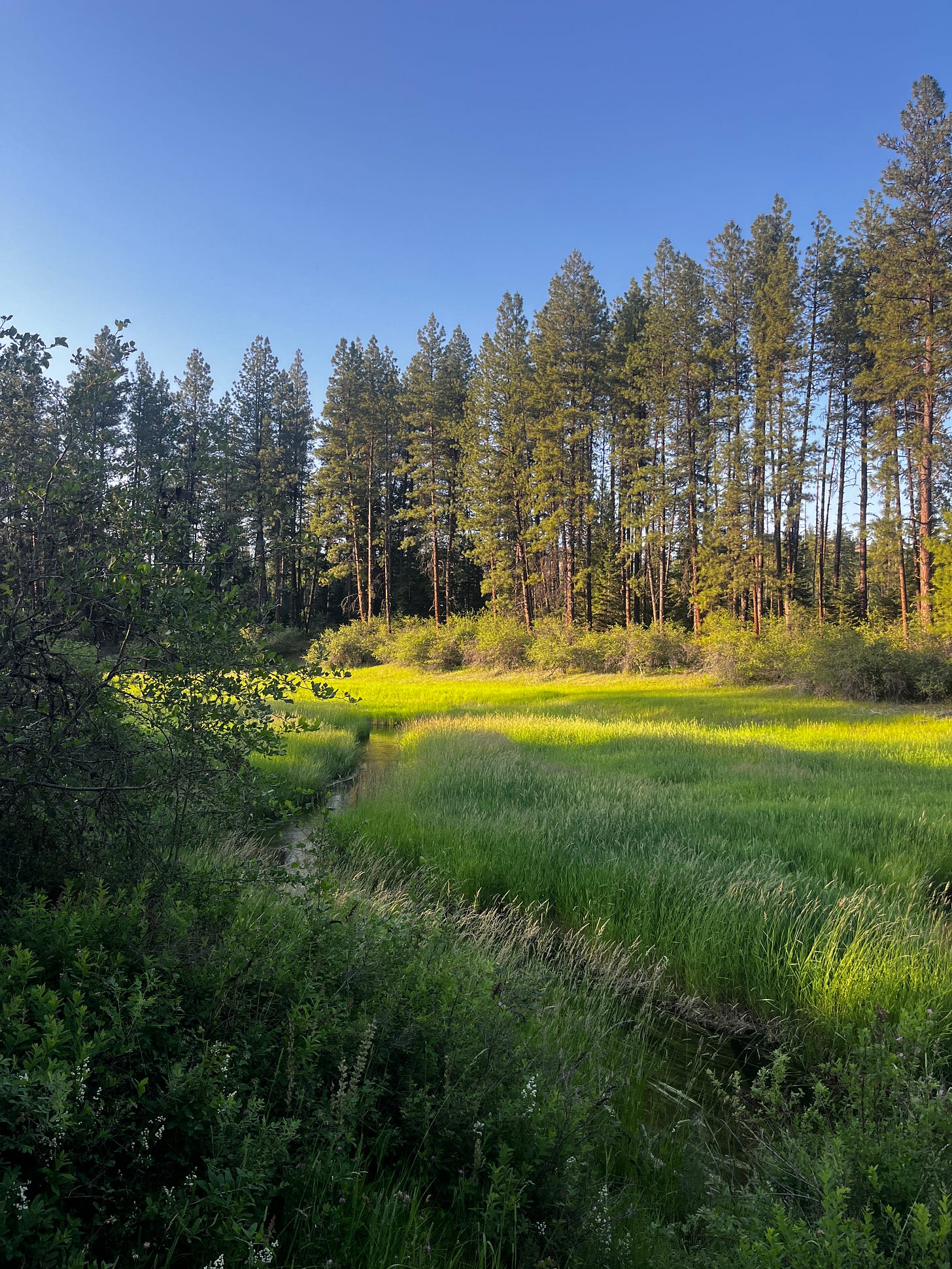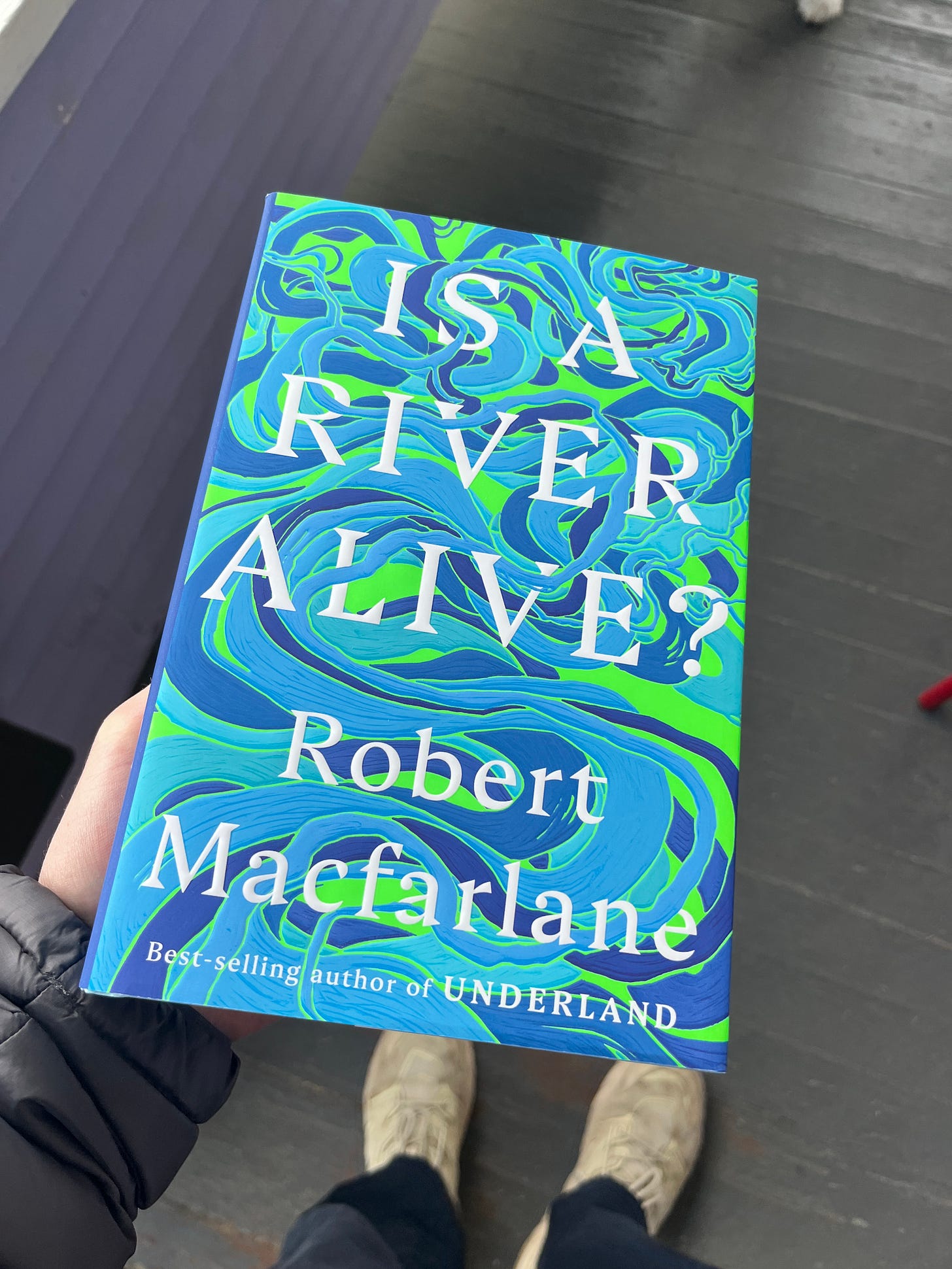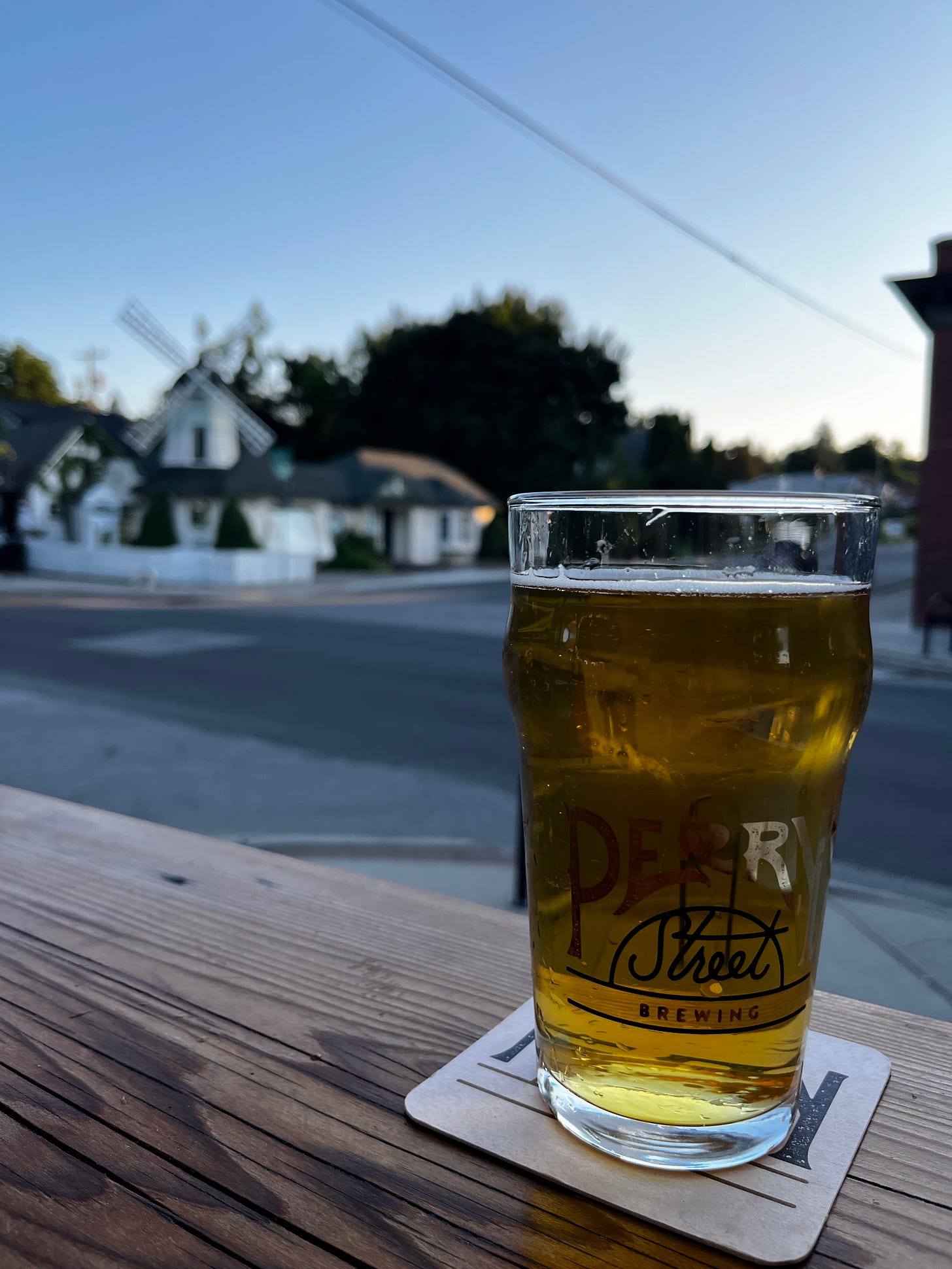Behind the Fence Was the Whole World
A midweek camping trip spurred by global dread spurred by too much screen time yields a chilling discovery in the middle of the woods.
With the wife gone and a midweek Juneteenth holiday, the dog and I load up the van and head north. We have one night and no agenda; the only thought is a spot by a creek.
As we make our way, a fire burns east of the highway. I had received notification of it on my phone. It was the first this year I can recall needing aerial backup. Pieces of disintegrated life cloud the otherwise blue sky. The sun is beating, and the bumpers are back to back. I play the first release of a favorite artist. Humming along to songs I haven’t listened to since early college winters. Remembering headphones in and endless walking and snow.
Traffic eventually breaks; we set the cruise just above 60 and carry on.
Reaching Usk, we cross the Pend Oreille River. A more enigmatic, bigger sibling to the river we know well, the Spokane. I crossed the Pend Oreille in this same spot last fall, turning north and heading to a friend’s wedding I was invited to officiate. For something different, we go south. Eventually coming across the Skookum Creek campsite, free with a Discover Pass. We pull in and find a spot. An easy task — all but one are vacant.
Creek serenity is quickly balanced by mosquito mayhem. They are all over the dog and me. Realizing this after having set up the stove, I make food fast and then we retreat to the van. I hang the mosquito net from the door frame, the bird songs free to still penetrate.
I decided to get out of town for the night because I had been on my screen too much. Spending chunks of the day reading articles about public land, like the place I presently camped, possibly being put up for private sale. About ICE agents detaining thousands of people, separating children from mothers. Articles full of a swirl of information overload that sang a melody of despair. My wife was gone for the week, at a conference in San Diego. As a state employee, I had Juneteenth off. With it falling on a Thursday, a Wednesday night jaunt seemed necessary to help get the despair song unstuck from my head.
The last article I had read was about Israel and Iran. As I packed the van earlier that day, I had thoughts about what it might be like to be off-grid the night a nuclear bomb was dropped. This increasingly seeming not an unreasonable premise with Iran and Israel escalating their tensions hourly. Just before leaving, Iran had promised Israel a, “gift this evening the world will remember for centuries to come.”
Inside the mostly mosquito-free van, the dog lay snug against my thigh. I had picked up Treasure Island from the library before setting off, having never read the Robert Louis Stevenson classic. Its escapism was welcome.
Birds sang and insects buzzed, and their symphony piqued the interest of Ollie the Aussie. Hearing their chatter, he would raise his head at the loudest bunch every few minutes or so. A moth fluttered up to the net around the doorframe, drawn by the light on the inside. The other campers yelled at their dachshund. After breaking the vow made with myself of only eating one BBQ Pringle at a time by sticking three into my mouth at once, I had to counteract my unceasing consumption by gnawing on a stick of gum.
I take Ollie for a final evening pee. I do the same. He sniffs my stream and jumps away in confusion. Sleep not far off, the sun now gone; I lock the doors, turn off the lights, and we go to bed.
I recently read Robert Macfarlane’s phenomenal new book, Is A River Alive? In it, early on and quite pointedly, he states,
“We all live in a watershed.”
How can a phrase so localized be so universal? Many are held by many. All are held by one.
That night beside Skookum Creek, the Pend Oreille watershed is holding hundreds of thousands of mosquitoes, the most beautiful of songbirds, deer I longed to but did not see, and, at present, a man and his dog. I do not know if outside this watershed, in the watersheds of Tel Aviv and Tehran, the Yarkon River and the Namak Basin, the world has begun to end. Perhaps tomorrow will have something to say about this.
It will. But in unexpected ways.
The morning wakes us. We will hike today. Again, no pre-plan on that front. But we know it won’t be at Skookum Creek campground. Because as morning comes, the mosquitoes persist.
Ensuring all is packed up and there is not a trace of us left, Ollie and I hit the road once more. In and out of reception, I find a place to hike a few miles down the road. In the intermittent service, my phone yields no notification of nuclear armageddon. After I get an idea of where to go, I put the phone away and trust my own sense of direction.
We reach the lot of the trail and we have it to ourselves. Serving cross-country skiers in the winter, the paths are overgrown by grass but marked by blue diamonds pounded into ponderosa pine. We follow the Cougar Trail out toward the Perspiration.
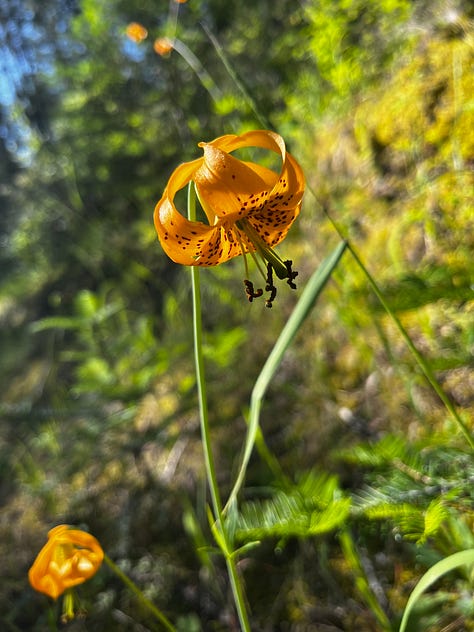
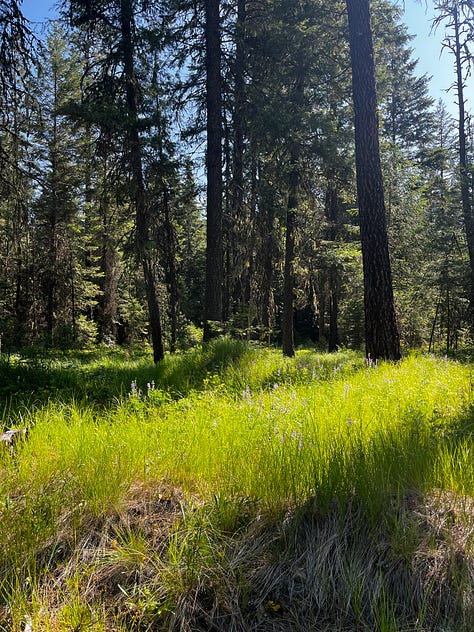
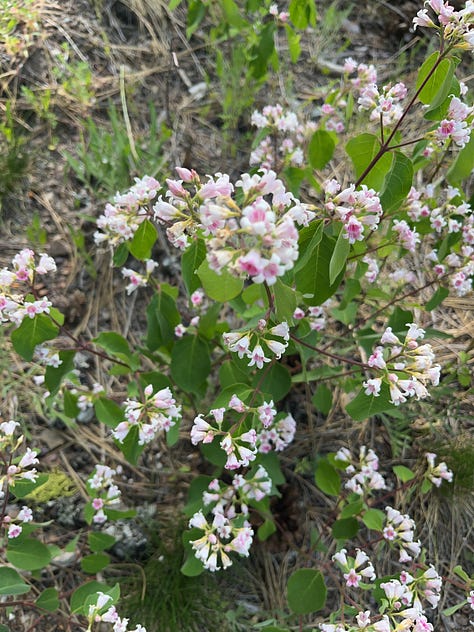
It is very quiet. The light is doing what it does through the trees, capturing dancing dust and branch. I pass by tiger lilies and a bushel of spreading dogbane. The landscape feels alive. The place seems flexible and fluid, free to come into itself. I am reminded of a quote from one of the characters in Macfarlane’s Is A River Alive, Yuvan Aves, a naturalist around my age from Chennai, India:
“My own spiritual observation has been that a small 'self' suffers and causes suffering, that a love of the living world lets single identities and selfhoods expand and encompass other beings, entities, and whole landscapes, such that the self becomes a spacious thing.”
I feel myself becoming spacious. As song sparrows and warblers sing, as I pass by more tiger lilies and pause, looking up at them from below and seeing the pattern that gives them their name. I remember a practice an author I admire shared at a workshop I recently attended. He got it from the anonymous author of The Cloud of Unknowing.
Find a word, any word, for God. Let that word be the word for you. Fasten it to your heart. Let it work upon you.
I begin to say my word and I see it work upon the landscape. I feel the screen woe subsiding.
But then the tomorrow that is now today has something to say about yesterday’s woe.
Rounding a corner, the landscape is broken. A boundary of high fence and barbed wire strung along top. Wood posts every 8 feet or so, connect metal chain link. About two miles back into the forest, this is a bit unexpected. But I teeter on conspiracy theorist, I love a good UFO. I’m intrigued. Ollie and I proceed closer, I see a sign.
Please Keep Out: This land is part of the US Geological Survey Magnetic Observatory. Access may be sensitive to magnetic instruments.
USGS? Magnets? Sensitive equipment in the middle of the woods?
On the other side of the fence I see old wooden structures with windows. A car or two is tucked way back, but it doesn’t look like they’ve been used recently. The whole scene looks like one of the abandoned scapes in the post-apocalyptic show, The Last of Us.
I had plans for a coffee and a baked good on the way home. Seeing this, I now had something to research while consuming them. For awhile we follow the parameter of the gate, off trail. Eventually, we turn back to find the blue diamonds on the ponderosas. We make our way out of the woods.
I’m a think local guy. At least that’s what I have been telling myself. As the world seems to spiral into disarray and everyone identifies themselves with their politics, I have tried to ground myself by focusing on what is proximal.
I find comfort in things like my neighbors’ weird but endearing habits with mice and walking the same loop in my neighborhood daily. I type this while sitting at a brewery I go to often that is on the street that I live that is across the street from the indie bookstore where I bought the Robert Macfarlane book that is four buildings down from the church I pastor which is one block from the coffee shop that I’ll likely make some edits to this piece. All of this on 11th Ave — a one beside a one. An I and I, like the Rastafarian idea of oneself being in union with the other.
Living in such a setting is a privilege and a luxury. I try not to let this be lost on me. In a sense, it is also a luxury to focus on local comings and goings. I don’t always do this, as my need for van escape proves.
As the outside world seems to be spiraling toward end, I’ve convinced myself that seeing what is near and in front of me will at least allow me to know, intimately, how that unfolds.
Behind that fence in the Colville National Forest is some of the most highly sophisticated electromagnetic equipment on Earth. That equipment is designed to alert the US Government — via a patch of Earth in Northeast Washington — that a nuclear bomb has been dropped somewhere in the world.
Say, Iran or Israel.
The Pend Oreille watershed holds the tools to listen to the destruction of the watersheds of the Yarkon River, of the Namak Lake Basin.
Everybody lives in a watershed.
Had a nuclear bomb gone off in my one-day-away escapade, I happened to have found a place on Earth strategically set up to sense that happening, even with no screen to inform.
If it had, would the vibration this equipment is created to detect cause a song sparrow to pause? Would the tiger lily tremble? Would it move a mosquito into flight?
Would I, and the name for God that I whispered to the forest, receive that ever-so-slight ripple into my body, even if not knowing it was occurring, as the earth below trembled and sensors behind the fence graphed the violent language shouting halfway around the world?
Everybody lives in a watershed. Everybody lives on Earth. What could be more beautiful, what could be more damning?
There are stories, an unimaginable number, that we all share. You have seen the sunset and so have I and so has everyone with eyes to see.
Love, springtime, rain.
Even if the characters are different, even if the watersheds that run through these stories go by different names. There are moments of recognition, of confluence, that we all share.
What one does somewhere is released somewhere else. Governments make equipment to ensure this.
But then there is the here and there of things like love and loss, hope and hate. Universal emotions undergirding and flowing through all psyche and soul.
“My own spiritual observation has been that a small 'self' suffers and causes suffering, that a love of the living world lets single identities and selfhoods expand and encompass other beings, entities, and whole landscapes, such that the self becomes a spacious thing.”
Yuvan Aves
The human “machine” capable of allowing us to feel what occurs to another halfway around the world is simple. It is the same machine that allows us to feel connected to any other. It doesn’t rely on sophisticated magnetic equipment or kilotons of explosion.
It is simple kinship.
We all share an origin — this earth, one another.
We all have the ability to make the self a bit more spacious.
What you feel, an other can feel.
When did we turn off this machine that hums with the undercurrent of our relatability? How might we turn it back on? In what forest might its mechanics and possibility reside within, tucked back only a mile or so?
—
Water sheds itself over the great Big Blue. We are here. We are not on Mars. Are we seeing this?

